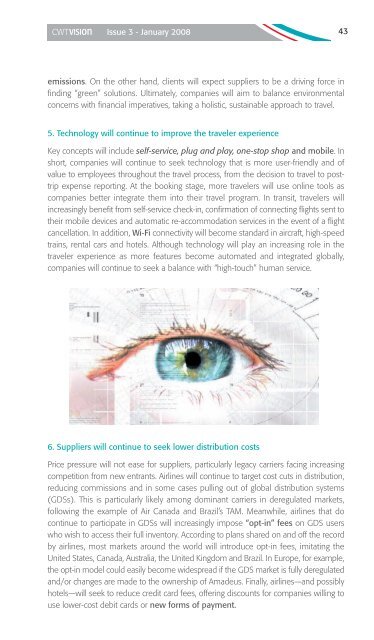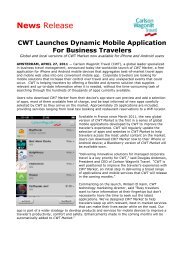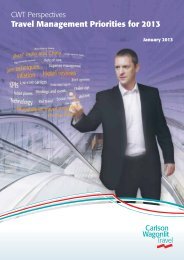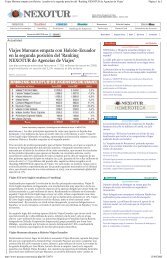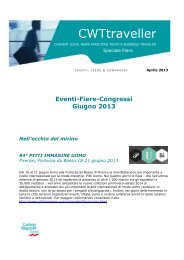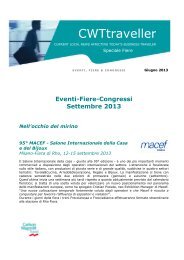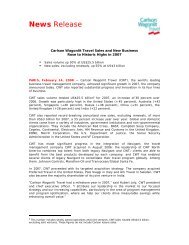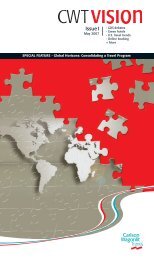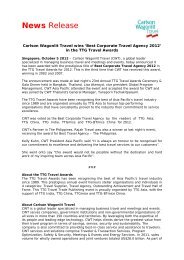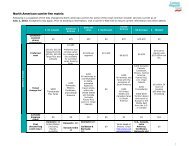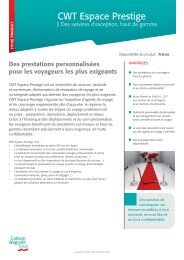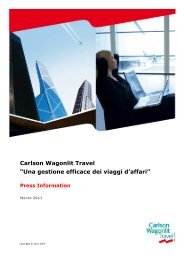Getting With the Program - Carlson Wagonlit Travel
Getting With the Program - Carlson Wagonlit Travel
Getting With the Program - Carlson Wagonlit Travel
Create successful ePaper yourself
Turn your PDF publications into a flip-book with our unique Google optimized e-Paper software.
CWTvIsIon Issue 3 - January 200843emissions. On <strong>the</strong> o<strong>the</strong>r hand, clients will expect suppliers to be a driving force infinding “green” solutions. Ultimately, companies will aim to balance environmentalconcerns with financial imperatives, taking a holistic, sustainable approach to travel.. Technology will continue to improve <strong>the</strong> traveler experienceKey concepts will include self-service, plug and play, one-stop shop and mobile. Inshort, companies will continue to seek technology that is more user-friendly and ofvalue to employees throughout <strong>the</strong> travel process, from <strong>the</strong> decision to travel to posttripexpense reporting. At <strong>the</strong> booking stage, more travelers will use online tools ascompanies better integrate <strong>the</strong>m into <strong>the</strong>ir travel program. In transit, travelers willincreasingly benefit from self-service check-in, confirmation of connecting flights sent to<strong>the</strong>ir mobile devices and automatic re-accommodation services in <strong>the</strong> event of a flightcancellation. In addition, Wi-Fi connectivity will become standard in aircraft, high-speedtrains, rental cars and hotels. Although technology will play an increasing role in <strong>the</strong>traveler experience as more features become automated and integrated globally,companies will continue to seek a balance with “high-touch” human service.6. Suppliers will continue to seek lower distribution costsPrice pressure will not ease for suppliers, particularly legacy carriers facing increasingcompetition from new entrants. Airlines will continue to target cost cuts in distribution,reducing commissions and in some cases pulling out of global distribution systems(GDSs). This is particularly likely among dominant carriers in deregulated markets,following <strong>the</strong> example of Air Canada and Brazil’s TAM. Meanwhile, airlines that docontinue to participate in GDSs will increasingly impose “opt-in” fees on GDS userswho wish to access <strong>the</strong>ir full inventory. According to plans shared on and off <strong>the</strong> recordby airlines, most markets around <strong>the</strong> world will introduce opt-in fees, imitating <strong>the</strong>United States, Canada, Australia, <strong>the</strong> United Kingdom and Brazil. In Europe, for example,<strong>the</strong> opt-in model could easily become widespread if <strong>the</strong> GDS market is fully deregulatedand/or changes are made to <strong>the</strong> ownership of Amadeus. Finally, airlines—and possiblyhotels—will seek to reduce credit card fees, offering discounts for companies willing touse lower-cost debit cards or new forms of payment.


